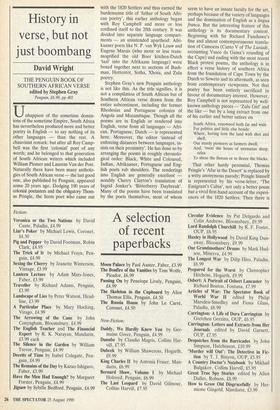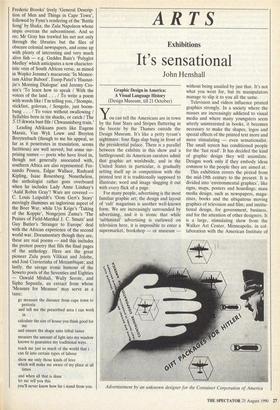History in verse, but not just boombang
David Wright
THE PENGUIN BOOK OF SOUTHERN AFRICAN VERSE edited by Stephen Gray Penguin, £6.99, pp.402 Unhappiest of the sometime domin- ions of the sometime Empire, South Africa has nevertheless produced more and better poetry in English - to say nothing of its other languages - than the rest. A chauvinist remark: but after all Roy Camp- bell was the first 'colonial' poet of any worth; and he belonged to that generation of South African writers which included William Plomer and Laurens Van der Post. Naturally there have been many antholo- gies of South African verse - the last good one, also published by Penguin, appeared some 20 years ago. Dodging 100 years of colonial poetasters and the obligatory Thom- as Pringle, the Scots poet who came out with the 1820 Settlers and thus earned the burdensome title of 'father of South Afri- can poetry', this earlier anthology began with Roy Campbell and more or less confined itself to the 20th century. It was divided into separate language compart- ments - an unintended apartheid: Afri- kaaner poets like N. P. van Wyk Louw and Eugene Marais (who more or less trans- mogrified the old Boer kitchen-Dutch 'Mal' into the Afrikaans language) were boxed together next to sections of Bush- man, Hottentot, Sotha, Xhosa, and Zulu poetry.
Stephen Gray's new Penguin anthology is not like this. As the title signifies, it is not a compilation of South African but of Southern African verse drawn from the entire subcontinent, including the former Rhodesias and Portuguese colonies of Angola and Mozambique. Though all the poems are in English or rendered into English, verse from all languages - Afri- can, Portuguese, Dutch - is represented here. Moreover, the editor 'instead of enforcing distances between languages, in- sists on their proximity'. He has done so by arranging the poems in roughly chronolo- gical order: Black, White and Coloured, Indian, Afrikaaner, Portuguese and Eng- lish poets rub shoulders. The renderings into English are generally excellent notably Cherry Clayton's translation of Ingrid Jonker's 'Bitterberry Daybreak'. Many of the poems have been translated by the poets themselves, most of whom seem to have an innate faculty for the art, perhaps because of the variety of languages and the domination of English as a lingua franca. But the interesting feature of this anthology is its documentary content. Beginning with Sir Richard Fanshawe's fine and almost contemporaneous transla- tion of Camoens (Canto V of The Lusiads, recounting Vasco da Gama's rounding of the Cape) and ending with the most recent Black protest poems, the anthology is in effect a verse history of southern Africa from the foundation of Cape Town by the Dutch to Soweto and its aftermath, as seen from contemporary viewpoints. Not that poetry has been entirely sacrificed in favour of documentary interest. However, Roy Campbell is not represented by well- known anthology pieces - 'Zulu Girl' and the like - but by a long extract from one of his earlier and better satires on South Africa, renowned both far and wide For politics and little else beside:
Where, having torn the land with shot and shell, Our sturdy pioneers as farmers dwell, And, 'twixt the hours of strenuous sleep, relax To shear the fleeces or to fleece the blacks.
That other hardy perennial, Thomas Pringle's 'Afar in the Desert' is replaced by a witty anonymous parody; Pringle himself is represented by his verse-letter, 'The Emigrant's Cabin', not only a better poem but a vivid first-hand account of the experi- ences of the 1820 Settlers. Then there is Frederic Brooks' lively 'General Descrip- tion of Men and Things in Cape Town', followed by Fynn's rendering of the 'Battle Song' by Shaka, the Zulu Napoleon whose impis overran the subcontinent. And so on; Mr Gray has trawled his net not only through the libraries but the files of obscure colonial newspapers, and come up with plenty of interesting and very much alive fish — e.g. Geddes Bain's 'Polyglot Medley' which anticipates a now character- istic vein of South African verse, as mined in Wopko Jensma's macaronic 'In Memor- iam Akbar Babool', Essop Patel's `Haanat- jie's Morning Dialogue' and Jeremy Cro- nin's 'To learn how to speak / With the voices of the land . . . / To write a poem with words like / I'm telling you, / Stompie, stickfast, golovan, / Songolo, just boom- bang . . . / To voice without swallowing / Syllables born in tin shacks, or catch / The 5.15 ikwata bust fife / Chwannisberg train.' Leading Afrikaans poets like Eugene Marais, Van Wyk Louw and Breyten Breytenbach (though to me his appeal, so far as it penetrates in translation, seems factitious) are well served; but some sur- prising names — poets who have lived in, though not generally associated with, southern Africa are also represented: Fer- nando Pessoa, Edgar Wallace, Rudyard Kipling, Isaac Rosenberg. Nonetheless, the anthologist rather goes overboard when he includes Lady Anne Lindsay's `Auld Robin Gray'! Wars are covered C. Louis Leipoldt's `Oom Gert's Story' movingly illumines an inglorious aspect of the Boer War, while Uys Krige's 'Taking of the Koppie', Nongejeni Zuma's 'The Praises of Field-Marshal J. C. Smuts' and Guy Butler's 'Stranger to Europe' deal with the African experience of the second world war. Documentary though they are, these are real poems — and this includes the protest poetry that fills the final pages of the anthology. Here are the great pioneer Zulu poets Vilikazi and Jolobe, and Jose Cravierinha of Mozambique; and lastly, the savage ironic humour of the Soweto poets of the Seventies and Eighties — Oswald Mtshali, Wally Serote, and Sipho Sepamla, an extract from whose `Measure for Measure' may serve as a taste: go measure the distance from cape town to pretoria and tell me the prescribed area i can work in . . .
calculate the size of house you think good for me and ensure the shape suits tribal tastes measure the amount of light into my window known to guarantee my traditional ways . . .
teach me just so much of the world that i can fit into certain types of labour show me only those kinds of love which will make me aware of my place at all times and when all that is done let me tell you this you'll never know how far i stand from you.











































 Previous page
Previous page